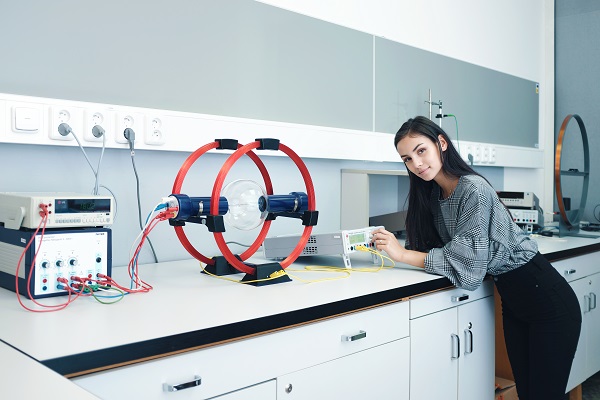1. Electron theory of the metallic state. Cohesion forces of solid matters; types of elementary bonding and their influence on properties of materials. Classification of solid matters according to chemical bonds. Cohesive energy of the metal, band theory, standard metals and transition metals.
2. Crystalline materials (polymorphism), standard type of crystal lattices, plains and directions, reciprocal lattice. Brillouin zone, conductors, insulators, semiconductors. Specific heat.
3. Crystal structure defaults: vacancies, dislocations, stacking faults, grain boundaries in crystals. Single crystals, polycristalline and amorphous metals. Solid solution, intermetallic phases. Linear expansion and volume changes during phase transformation in solid state.
4. Conducting materials. Physical principles of the electrical conductivity of metals, basic characteristic of conductors, superconductivity. Metallic conductive materials (Cu, Al, W, Mo, …) and their alloys, carbon materials.
5. Special conducting materials. Contact materials, resistance materials, thermocouples, bimetals, solders, metals and alloys for safety-fuse, shape memory materials. Superconducting materials.
6. Physical properties and main kinds of semiconductor materials. Semiconductor materials: elementary and compounds. Basic demands on preparation of pure materials.
7. Refining and structure improving methods, zone refining, directional crystallization, distillation. Methods of crystal growing, Czochralski method. Types of semiconductors (AIIIBV, AIIBVI). Technology of thin layers deposition (epitaxy) and junction (diffusion).
8. Magnetic materials. Basic relations, notions, fundamentals of the ferromagnetism, characteristics of magnetic materials. Standard types of magnetic materials.
9. Soft magnetic material (Fe-Si, Fe-Ni), metallic glasses. Hard magnetic material. Ferrites. Structure, classification, processing technologies, characteristics and application domains.
10. Dielectrics and insulators, characteristics and structure insulators, polarization and permittivity of dielectrics, electrical conductivity of insulators.
11. Specific dielectric strength of solid state insulators, breakdown and basic breakdown types, properties of insulators.
12. Overview of electro-insulating materials. Gaseous, liquid and solid state insulators, inorganic insulating material.
13. Construction materials, basic classification: steel, cast iron, non-ferrous metals and alloys, composites, ceramics.
14. Properties of construction materials and methods of mechanical testing: tensile test, compression test, notched test, fracture toughness, fatigue and creep.
2. Crystalline materials (polymorphism), standard type of crystal lattices, plains and directions, reciprocal lattice. Brillouin zone, conductors, insulators, semiconductors. Specific heat.
3. Crystal structure defaults: vacancies, dislocations, stacking faults, grain boundaries in crystals. Single crystals, polycristalline and amorphous metals. Solid solution, intermetallic phases. Linear expansion and volume changes during phase transformation in solid state.
4. Conducting materials. Physical principles of the electrical conductivity of metals, basic characteristic of conductors, superconductivity. Metallic conductive materials (Cu, Al, W, Mo, …) and their alloys, carbon materials.
5. Special conducting materials. Contact materials, resistance materials, thermocouples, bimetals, solders, metals and alloys for safety-fuse, shape memory materials. Superconducting materials.
6. Physical properties and main kinds of semiconductor materials. Semiconductor materials: elementary and compounds. Basic demands on preparation of pure materials.
7. Refining and structure improving methods, zone refining, directional crystallization, distillation. Methods of crystal growing, Czochralski method. Types of semiconductors (AIIIBV, AIIBVI). Technology of thin layers deposition (epitaxy) and junction (diffusion).
8. Magnetic materials. Basic relations, notions, fundamentals of the ferromagnetism, characteristics of magnetic materials. Standard types of magnetic materials.
9. Soft magnetic material (Fe-Si, Fe-Ni), metallic glasses. Hard magnetic material. Ferrites. Structure, classification, processing technologies, characteristics and application domains.
10. Dielectrics and insulators, characteristics and structure insulators, polarization and permittivity of dielectrics, electrical conductivity of insulators.
11. Specific dielectric strength of solid state insulators, breakdown and basic breakdown types, properties of insulators.
12. Overview of electro-insulating materials. Gaseous, liquid and solid state insulators, inorganic insulating material.
13. Construction materials, basic classification: steel, cast iron, non-ferrous metals and alloys, composites, ceramics.
14. Properties of construction materials and methods of mechanical testing: tensile test, compression test, notched test, fracture toughness, fatigue and creep.
